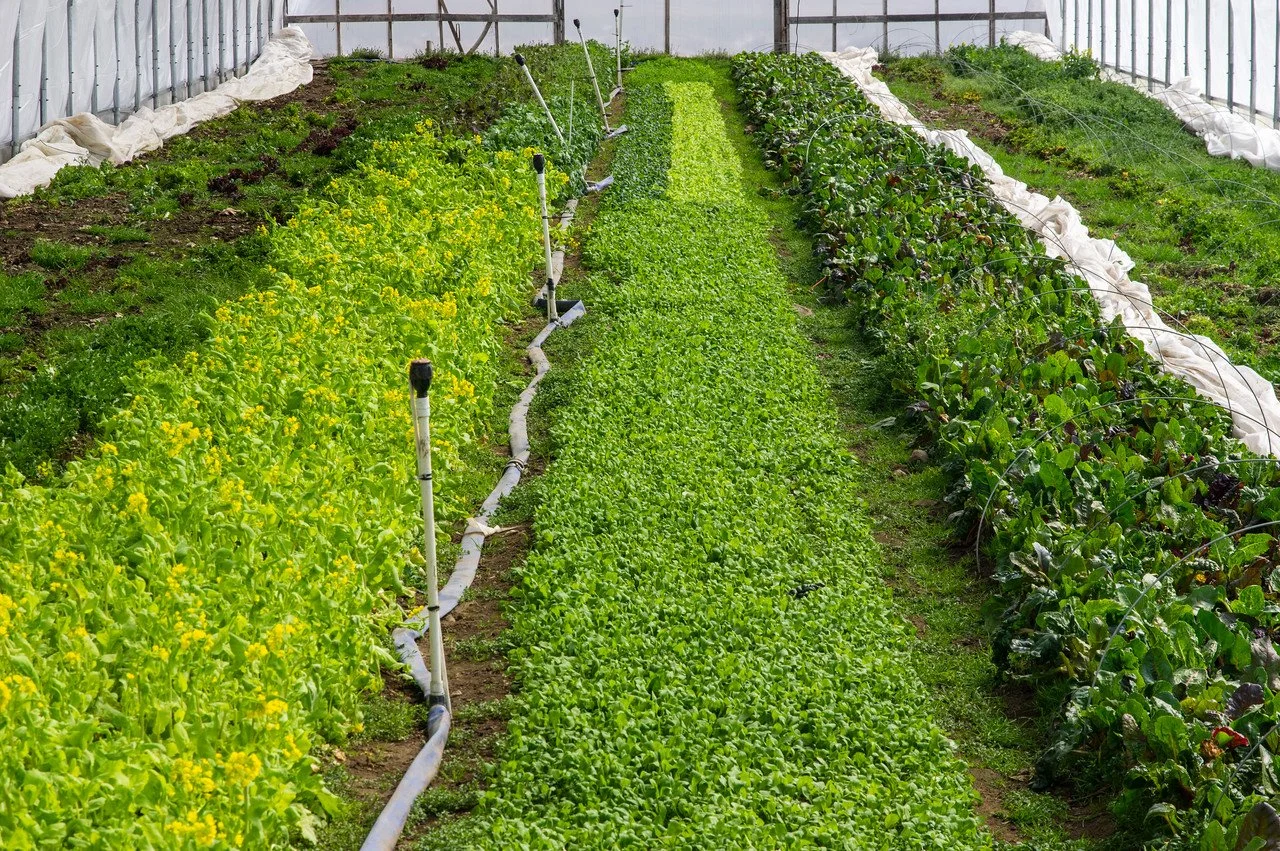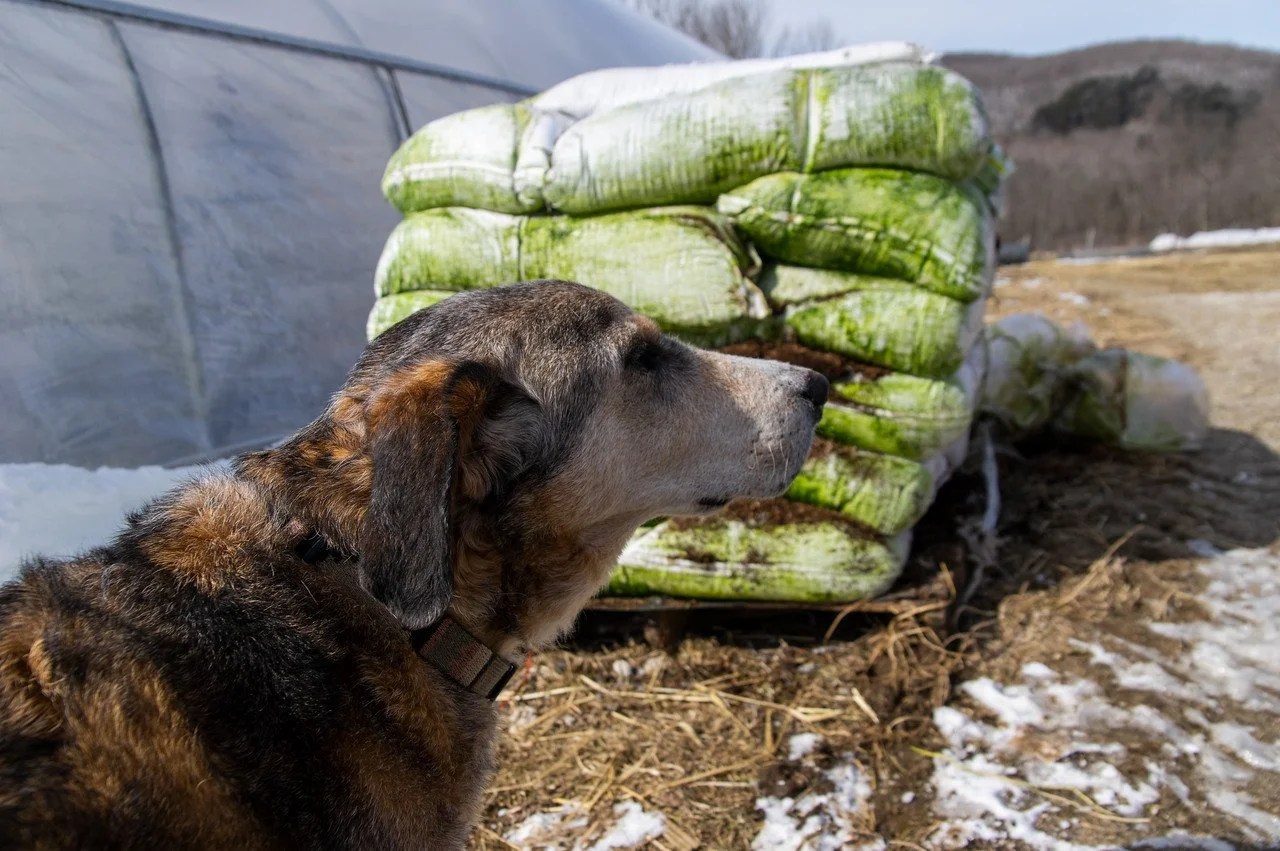8th Week of the Winter/Spring CSA season: Week of April 6th
Molly seeding tomatillos for our gardens and yours, photo by Adam Ford
This Week’s Availability
This week we will have red beets, watermelon radishes, orange carrots (Juniper Hill), rainbow carrots (Juniper Hill), shallots, red and yellow onions (Juniper Hill), garlic, red and yellow potatoes (Atlas Farm), fingerling potatoes (Clearfield Farm), spinach, mesclun mix, baby chard, green curly kale, baby kale, claytonia, and frozen heirloom/beefsteak tomatoes.
The frozen heirloom/beefsteak tomato bags are “2 items worth” and are delicious for stewing.
Ordering closes at noon on Tuesdays for Wednesday bags, and at midnight on Wednesday for Friday bags.
You do not need to fill out the form if you plan to come to the barn on Wednesdays or Thursdays to pick out your items yourself.
Some beautiful shades of green in the Trunchbull, photo by Adam Ford
This is one of the bioassay trays to compare our new and old potting mix we wrote about last week. Ryan is usually able to read his own handwriting. photo by Adam Ford
Farm News
This was a week of seeding! We seeded over 100 trays of tomatoes, tomatillos, lettuce, cucumbers, sprouting broccoli, kale, basil, leeks, beets, fennel, flowers and more in the propagation house. And outside, Ryan and Katie direct seeded the first rounds of outdoor crops: mesclun mix, baby lettuce mix, spinach, radishes, bok choi, salad turnips, arugula, and baby kale. They were able to get the outdoor seeding done before all the rain, which would have made the soil too wet to work in. The planting will be covered for about one week with old recycled greenhouse plastic, which will warm the soil to hasten germination. After these early seedlings begin to germinate, the clear plastic will be replaced by row cover, which will continue to create a warm microclimate but will not risk overheating the delicate seedlings. We rely on these early outdoor planting to dovetail with the end of the spring tunnel harvest. Starting in mid-April, we have to clear out the remaining winter greens to make way for the summer crops that grow in the tunnels (like tomatoes and cucumbers), so as the last few tunnel beds get removed, those early outdoor greens will become ready to harvest. It’s fun to have some simple tricks to begin the outdoor gardening season much earlier than usual.
Cindy continues to work on repairs and infrastructure projects, and what she and Ryan have accomplished so far has made all our work so much easier. For example, we have a new roll down cover on one of our seedling tables, which greatly simplifies covering the tables on cold nights.
I think my highlight this week was getting to see how much our kiddos are actually enjoying their time “helping” with the team. Sky effectively transplanted many bok choi seedlings with Taylor and Molly after school one day, and Soraya has surprisingly effective fine motor skills to seed tiny seeds in the tray cells. I remember really enjoying helping my mom in our community garden plot growing up, so it’s a delight to watch them also enjoy this exposure…especially since being a parent to a 5 and 3 year old is not always as idyllic as watching them seed and transplant!
As I have written about in the past, plenty of “invisible work” keeps me busy these days. I try to pack in everything I can because I have to scale back my “non-production” work during the busier summer season. I read a great commentary piece by NOFA’s policy director, Maddie Kempner, last month that explains the policy initiative of seeing small scale farming for what it is: an essential piece of the climate crisis solution puzzle. If you are curious about the efforts to recognize farm work as ecosystem work, check out her piece in VT Digger. You have heard me talk about it before, but the majority of folks who farm at this scale are either motivated to do this work because we see it as essential work for the environment, we love being outside, we love providing something important for the community, or a blend of all those motivations. But it’s physically demanding, low paid, never ending work, so having the policy discussion of paying farms for their work as ecosystem stewards is important.
This week we learned that friends who have been running a successful farm business in the Upper Peninsula of Michigan decided to stop their farming operation and change paths. Kate and Joe worked here in 2016 and 2017 before starting their own farm. Every time a small farm decides to shift away from farming, I am both so sad (for the community to lose that access, for our collective environmental efforts that need as many small farms as possible), but also happy for those specific farmers to make the right decision for themselves. Joe and Kate wrote an eloquent description of their decision here, if you are curious about how other small farmers relate to their livelihood. Their piece resonates for me, even though we are still continuing to run our own vegetable farm. Kate and Joe’s impact in their community and the farm world won’t stop because they retired their business. (In fact, their farm inspired us to become certified organic years ago: we had always assumed the paperwork and record keeping was just too much to add to our plates… but seeing them become certified organic in their first year of operation was inspiring, so we finally did it… Their work as farmers means your CSA farm is certified organic!) But I can’t help but wonder if we already had state and national policies that systematically supported farmers to do this work, if maybe they wouldn’t have had to make this choice. My hope is that effective policies get adopted so we don’t keep losing small farmers in a future that we really need to be expanding our numbers. Vermont is hoping to be a leader in ecosystem services policies, that will ideally be adopted more widely throughout the country. Supporting small farms and farmers is part of the climate change solution… as a society, we can’t keep relying on enough farmers’ passion for the work to overcome their own personal burnout cycles. Maybe if this is important to you, reach out to your local senators and representatives, and tell them how much you value an effective local food shed.
Next week we will continue to fill up the propagation house with seedling babies, and continue to clear out beds in the high tunnel for later spring production. Have a great week!
-ESF Team: Kara, Ryan, Cindy, Taylor, Molly, Katie, and Vanessa
baby kale! photo by Adam Ford
onions germinating! photo by Adam Ford
supplies for many of the repair projects Cindy and Ryan are working on, photo by Adam Ford
this is a temperature sensor that alerts our phones when the temperature gets too cold in the propagation house for the little seedlings…. it’s not my favorite part of our job to have our sleep disrupted for plants, but it’s a great tool to have this time of year to avoid any big problems, photo by Adam Ford
robin in flight! photo by Adam Ford
Katie and Taylor working in the wash station, photo by Adam Ford
tractor waiting for work, photo by Adam Ford
Molly is getting the potting mix moist before seeding, Adam Ford
Molly and Kara seeding all the things, photo by Adam Ford
Echo posing in front of the last of two pallets of the potting mix that we know grows great plants. These pallets won’t be enough for all the seeding we need to do this season, so we hope all the tests we will run on the new stuff will show that we can dive into the newer batch, photo by Adam Ford
birds missed a seed this winter, photo by Adam Ford
beds in the barn field remained covered over the winter, photo by Adam Ford
Sky building towers in the propagation house
















